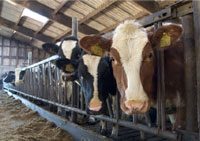Chemistry for Biomedical Applications
Applying physical and organic chemistry concepts to biomedicine
Contact Us
- Group Leader (Acting)
- Harshini Mukundan
- Deputy Group Leader (Acting)
- Kristy Nowak-Lovato
- Team Leader
- Harshini Mukundan
- Group Office
- (505) 667-7121
Physical and organic chemistry concepts to biomedical applications
Our work spans basic research on the nature of protein function and the production of high-value chemicals, like algae.
We conduct research on detecting biomarkers of disease in humans and animals. We also research the development of integrated global biosurveillance systems. This research is supported by a variety of sponsors.
The human immune system inspired the development of the Universal Bacterial Sensor—a unique technology that mimics biological recognition of bacterial pathogens. Like the immune system, the sensor recognizes all bacterial infections as early as before the existence of symptoms.
Harshini Mukundan led the team of Basil Swanson, Aaron Anderson, Jessica Kubicek-Sutherland, Ramamurthy Sakamuri and Loreen Stromberg.
A research breakthrough allowing the first direct, empirical, blood-based, cow-side test for diagnosing bovine tuberculosis (TB) could spare ranchers and the agriculture industry from costly quarantines. It could also prevent the mass slaughter of animals infected with this easily spread disease.
C-PCS researchers adapted an assay that was originally developed for human TB to bovine TB, a particular challenge because the bovine disease is caused by a different species of the pathogen. The team validated the assay in cows that were positive controls of a vaccination study done at the US Department of Agriculture, tested at different time points during the course of infection.
This work was recently published in the journal Analytical Science, and supports the global One Health strategy—which is to develop universal diagnostics that are not host-specific.

Mycobacterium bovis causes bovine tuberculosis, which easily spreads among large cattle herds, and can result in the quarantine and destruction of entire herds in the United States, Canada and abroad.





